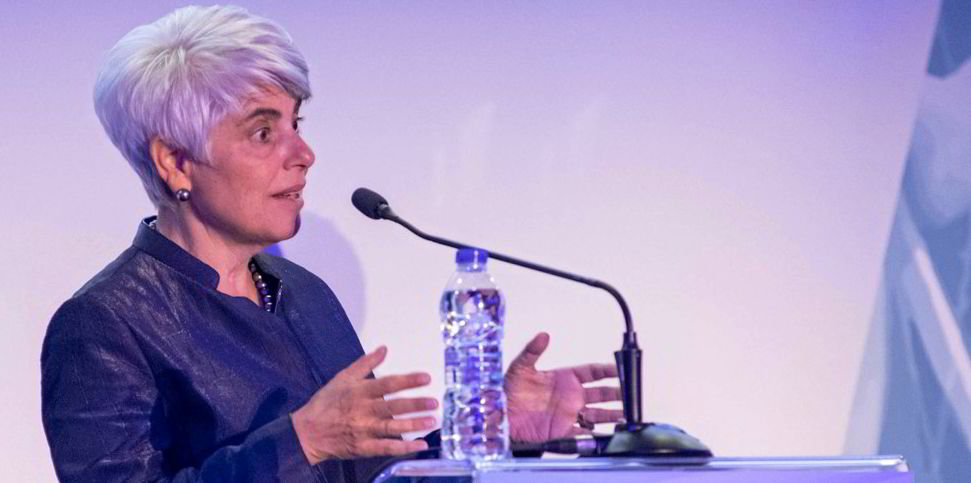Navios Maritime Partners chief executive Angeliki Frangou has been vocal that she sees the current moment in shipping as fraught with uncertainty.
Click the links below to read more:
For Angeliki Frangou’s Navios, newfound resiliency opens door to fresh opportunities
Amid questions over dividend, Frangou keeps focus on ‘total return’
For Angeliki Frangou, inefficiency is the one certainty in shipping’s outlook
Being present at Navios’ office throughout the pandemic: ‘You have to give comfort’
Navios Partners corporate governance of the ‘highest standard’, Frangou says
But with that comes one certainty in her outlook: inefficiency.
“We are living in a world of a lot of inefficiencies,” she said in an interview with TradeWinds at the Navios Group’s Pireaus headquarters.
Driven first by the pandemic and then by the geopolitics surrounding Russia’s war on Ukraine, those inefficiencies are driving tonne-miles — another term Frangou used frequently at her public appearances during Posidonia 2022 in Athens — across the three sectors in which New York-listed shipowner Navios Partners is involved.
Frangou is optimistic about bulkers and tankers, but she spoke with more caution about the container ship sector.
She noted that liner operators have locked in long contracts for tonnage, a positive sign for the market’s future.
But she said the reality is that the West is coming out of Covid-19, which pushed consumer demand towards goods and away from services.
“What we see is that we are moving from goods to services,” she said, explaining that the change will inevitably have an impact on the container ship sector.
With liner operators making record profits during the pandemic, Navios Partners’ customers have strong balance sheets. With its boxship fleet tied up on time charters to major container carriers, that translates to strong credit quality.
But there is another market inefficiency that could help the container ship sector, among others.
Frangou said a shift from just-in-time to just-in-case manufacturing leads to duplication of production.
“That creates more inefficiency — again, more tonne-miles,” she said.
The trend is a reaction to the supply chain crisis.
Just-in-time manufacturing led to more efficient supply chains until it suddenly stopped working because of congestion across logistics networks and shortages. The companies that had inventory were the ones that managed the crisis best, according to Frangou.

“That is something that the board of every company would like to have: just-in-case manufacturing. It is basically insurance,” she said.
In dry bulk and tankers, the company is monitoring economic concerns, as financial pundits warn of risks of a global recession.
But the direction of the global economy is not the main driver of strong rates in bulk commodities shipping, she said. “The inefficiency at this time is driving the market.”

And the positive tonne-mile impact of the market inefficiencies driven by the geopolitical situation appears here to stay.
In tankers, the world’s emergence from the pandemic, as it drives travel, is providing a strong outlook for demand.
For dry bulk, in which her Navios Maritime Holdings also has a significant fleet, sanctions against Russia have disrupted what had been more efficient trade flows.
“Right now, everything has to go further — come from further away and go further away — so the whole thing is very inefficient.”
Read more
- Amid questions over dividend, Frangou keeps focus on ‘total return’
- Being present at Navios’ office throughout the pandemic: ‘You have to give comfort’
- For Angeliki Frangou’s Navios, newfound resiliency opens door to fresh opportunities
- Navios Partners corporate governance of the ‘highest standard’, Frangou says




